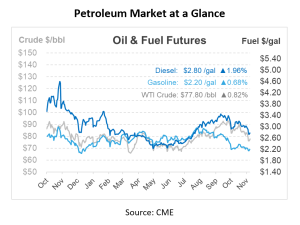
Fuel Management Strategies for Government Fleets
In a world that’s constantly changing, where budgets need to stretch further, and the demand for smooth operations is ever-present, effective fuel management has emerged as a crucial aspect of government fleet operations. Government agencies, from local municipalities to federal organizations like the US military, face unique challenges when it comes to fuel procurement and management.
Whether it’s a centralized procurement agency or a single operations site for the Department of Transportation, finding the right fueling solutions is essential. In today’s article, we will explore the best practices for government fleets, including fueling modes and strategies to optimize operational efficiency, ensure fuel price transparency, and simplify administrative processes.
Fueling Modes
Government fleets can employ many fueling modes, each with its unique advantages:
Bulk Tank – Truckload Purchasing: This mode involves purchasing fuel in bulk and receiving large deliveries via tanker trucks. It can be a cost-effective solution for agencies with substantial fuel requirements.
Bulk Tank – Cosigned Fuel: Similar to the first mode, payment is based on the amount of fuel dispensed into each vehicle, enabling precise tracking of fuel consumption.
Mobile Refueling/Wet Hosing: Mobile refuelers visit your location to fill up vehicles overnight, reducing the labor and time required for drivers to refuel.
Optimizing Operational Efficiency
An effective fuel program should optimize fueling methods based on cost and convenience, centralizing data to streamline decision-making. Transparent pricing methodologies empower administrators to compare vendors and eliminate hidden fees and surcharges, thereby enhancing transparency, while streamlined administrative processes can further enhance overall program efficiency.
Key features of a well-structured government fuel program should include:
- Cost-effective fueling method selection.
- Centralized data management to reduce the decision-making workload.
- Utilizing fleet cards as data hubs for efficient tracking and control of fuel transactions.
Government entities without on-site bulk tanks or those prioritizing employee productivity can benefit from mobile refueling or retail fueling using fleet cards for consistent control and expense tracking. With fleet cards, drivers can refuel at local gas stations, which offers convenience for fleets that travel extensively or have limited space for bulk tanks.
Effective data management should also be at the core of a best-practice fuel program, as it provides valuable insights into fleet performance. Seamless integration with software systems offers comprehensive reporting and analysis, empowering agencies to make informed decisions and monitor performance effectively.
Fueling Management Expert
Mansfield Energy has a proven track record as a trusted partner in government fuel management, securing contracts with federal agencies, state governments, procurement departments, transportation authorities, and local municipalities. Our comprehensive fuel solutions serve as the foundation for a successful fuel program that maximizes cost savings and operational efficiency. Embrace transparency, efficiency, and data to fuel your government fleet’s success. Contact Mansfield today!

This article is part of Daily Market News & Insights
Tagged:
MARKET CONDITION REPORT - DISCLAIMER
The information contained herein is derived from sources believed to be reliable; however, this information is not guaranteed as to its accuracy or completeness. Furthermore, no responsibility is assumed for use of this material and no express or implied warranties or guarantees are made. This material and any view or comment expressed herein are provided for informational purposes only and should not be construed in any way as an inducement or recommendation to buy or sell products, commodity futures or options contracts.





